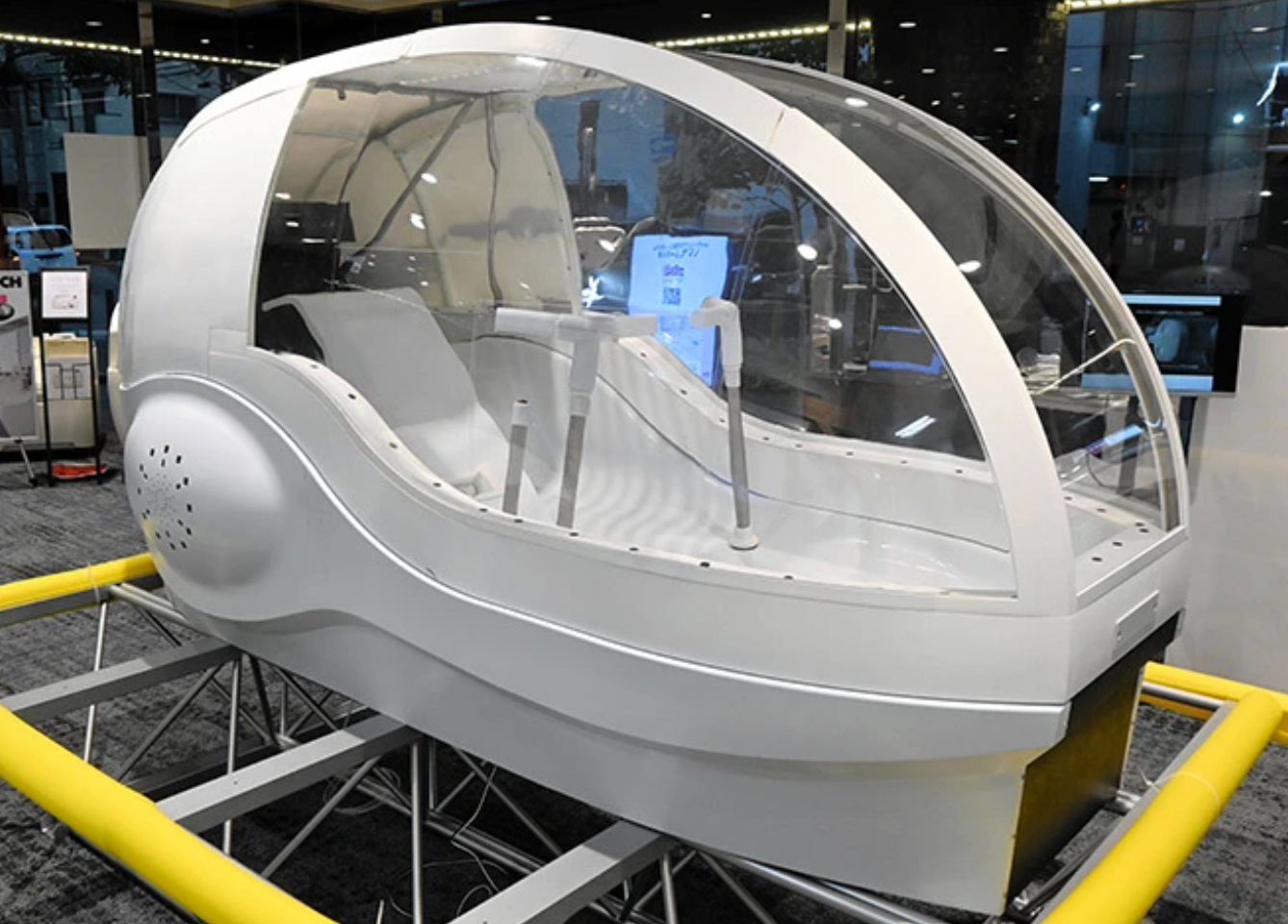Mainichi claims that the cutting-edge “Human Washing Machine” will make its debut at the 2025 Osaka-Kansai World Expo. It is a modernized version of the idea that was first presented by Sanyo Electric Co. at the 1970 Osaka Expo and now includes stress analysis, vital sign monitoring, and AI-driven personalization for a thorough cleaning experience.
The Human Washing Machine Of 1970
When Sanyo Electric Co. debuted a groundbreaking pod-like machine at the 1970 Osaka Expo, the idea of a human washing machine was born. The foundation for the current iterations was established by this initial invention. Although groundbreaking in its day, the 1970 model lacked the sophisticated features and comprehensive approach of its modern counterparts and was largely concerned with the physical act of cleaning.
The 1970 prototype was a simpler, mechanical approach to personal hygiene than the modern models that include AI, vital sign monitoring, and stress analysis3. Its debut at the Osaka Expo demonstrated Japan’s inventiveness and technological aspirations, laying the groundwork for the nation to remain at the forefront of creating cutting-edge personal care products. While respecting its historical roots, the resuscitation of this idea for the 2025 Osaka-Kansai World Expo shows how far technology has come in more than 50 years.
Intelligent Features And Advancements
The “Human Washing Machine of the Future” incorporates state-of-the-art technology to provide a thorough cleaning experience, demonstrating notable improvements over its 1970 predecessor. The Japanese showerhead business Science Co. created this novel device, which claims to wash the body and mind in just fifteen minutes. The machine offers a customized washing experience thanks to AI-powered technologies that track vital signs and assess stress levels. It also makes use of ultra-fine bubble technology, a sustainable method that guarantees complete cleaning while using less water.
This futuristic device’s salient features include:
AI-powered customization for the best possible cleaning.
monitoring vital signs to raise awareness of health issues.
The ability to analyze stress for mental health.
ultra-fine bubble technique to clean effectively and sustainably.
Its small, pod-like form is evocative of the original model from 1970.
In addition to improving cleaning, these clever inventions support Japan’s goal of exhibiting cutting-edge technology and environmentally friendly solutions at the 2025 Osaka-Kansai World Expo3.
Testing And Upcoming Projects
At the 2025 Osaka-Kansai World Expo, the “Human Washing Machine of the Future” will make its debut, go through rigorous public testing, and demonstrate Japan’s technological strength. The Japanese showerhead manufacturer that created this invention, Science Co., intends to use the expo as a venue to get insightful user input and improve the machine’s functionality. The company will be able to evaluate the efficacy of its AI-driven personalization, vital sign monitoring, and stress analysis capabilities in a broad population thanks to this real-world testing environment.
The human washing machine’s future intentions go beyond the fair; it could find use in a number of industries. A preview of the future of personal hygiene and wellbeing might be provided by the technology, which could be modified for use in medical facilities, wellness centers, and even private residences. Developers will probably concentrate on increasing the machine’s efficiency, extending its capacity for health monitoring, and further mitigating its environmental impact by implementing cutting-edge water-saving technology as the project progresses.
Alternatives On The Current Market
Alternatives on the market now provide useful assisted bathing options, even though futuristic human washing machines pique interest. For example, the Humanwash system offers a stand-alone washing solution for elderly and disabled people who would rather take showers on their own. This current technology fills the gap between completely automated systems and conventional bathing techniques.
To satisfy consumer needs, manufacturers are concentrating on eco-friendly and intelligent features in the larger washing machine market. Because of their exceptional cleaning capabilities and energy economy, front-loading machines have become more and more popular. IoT connectivity, AI-powered wash cycles, and water-saving technology are all included in many new models. For instance, the March 2024 introduction of Samsung’s AI Ecobubble washing machine promises 45.5% improved fabric care and 70% energy savings. These developments open the door for future advancements in personal hygiene products and show the industry’s dedication to sustainability and user ease.

